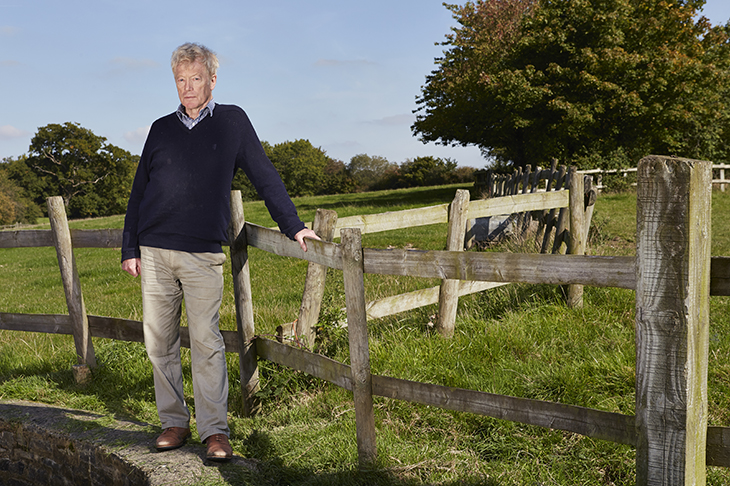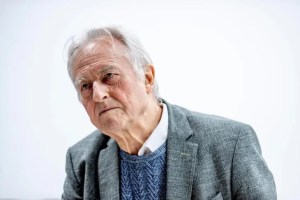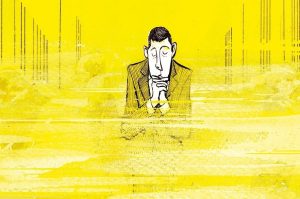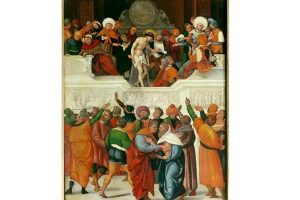Daniel Hannan
Roger Scruton changed the course of my life. He addressed my school’s philosophy society when I was 16, speaking so compellingly about Wittgenstein and language that, when he finished, no one wanted to ask the first question. So, more to fill an awkward silence than anything else, I stuck my hand up and asked him what he saw as the role of a conservative thinker. ‘The role of a conservative thinker,’ he replied, in his charmingly diffident manner, ‘is to reassure the people that their prejudices are true.’
That beautiful aperçu never left me. It animated my career in politics, not least during the Brexit referendum. I spent part of my gap year in what we then still called Eastern Europe, observing the end of communism. Roger had given me various materials to carry to his dissident friends, so I watched the revolutions through Scrutonian eyes. Although it is nowadays fashionable to portray 1989 as a ‘return to Europe’, it was clear at the time that people mainly wanted an end to foreign occupation and a return to national sovereignty. Roger used to call it ‘the politics of the first person plural’: the need for a shared sense of identity in an open society. He was spot on. He always was.
Timothy Garton Ash
‘There’s this very interesting Hungarian called, er, I think, Soros,’ said Roger, sitting in the bohemian book- and music-strewn thicket of his Notting Hill flat. This was sometime in the mid-1980s, and our shared desire to support dissidents in Czechoslovakia, Poland and Hungary had brought us together. Incredible though it may sound, no one had then heard of George Soros.
Our conspiratorial missions behind the Iron Curtain were, let’s be honest, also huge fun, but what needs to be remembered is the amount of hard, thankless charitable administration that Roger undertook, between writing his 50 or so books. Yet the boring agenda of those charitable trusts would be enlivened by Roger’s outrageous overstatements about the western intellectual and political establishment, slipping from his lips with a kind of silent chuckle.
The last time we sat down together at any length was when he invited me to talk about free speech at the Inner Temple, an ur-Burkean institution he visibly adored. Afterwards he wrote an email commenting on how one rather forceful, blind Iraqi refugee questioner ‘had mastered the snobbery of disadvantage so effectively and so much to his own advantage’ — characteristically provocative, probably unfair, and yet what a thought-provoking phrase ‘the snobbery of disadvantage’ is. He went on ‘we are beginning to learn, what of course we should have known from our experience with totalitarian communism, just how malleable human nature is, and how unlikely it is that truth will prevail. But after discussions such as yesterday’s one always feels a little more cheerful.’ As a lifelong liberal I shall miss this cheerfully pessimistic conservative.
Douglas Murray
I first met Roger almost 20 years ago. I was starting out at a web publication that promised to bring right and left to debate on equal terms. Of course the whole thing was stacked, but it introduced me to the only other conservative there — Roger — who spotted a kindred (if very junior) spirit. ‘Well Douglas,’ he said, ‘it’s you and me against about 50,000 leftists. So it’s a fair fight.’ Over the years that followed we ate together, traveled together, painted the rooms of his house in America together, and when I gave up the lease on my tiny London studio 10 years ago, I handed it over to Roger and his wife Sophie. I would go back regularly for meals and, accompanied by good wine, we would roam over everything. There is nobody whose mind I will miss more, and no one I still had so much to ask.
Last year Roger had a terrible experience that readers of this magazine will know about. I tried to be helpful. When I phoned him to tell him that the matter was solved, he asked nervously: ‘So do you think I still have a career?’ I could have cried. It reiterated the feeling I always had about him, which is that we were fortunate to have him, and too few people realized it. Spectator readers did of course. Last year at our event together in London more than a thousand readers got to their feet the moment we walked on stage to give Roger a standing ovation. It was a beautiful sight which slightly startled Roger, who when he realized what was happening produced that wonderful smile of shy gratitude.
Ayaan Hirsi Ali
Roger was a dear and generous friend, who gave freely to those who sought advice and wisdom, and he expected little in return. He was an inspiration to people like me. A defender of human rights, Roger opposed those who would divide people into tribal groups (immigrants, people of color, women) with an emphasis on perpetual victimization. The principles of a free society, he insisted, permitted individuals with grit and determination to excel in their vocations.
He was intellectually honest and brave. I hope we can carry on his legacy of courageous, free-thinking inquiry and activism.
Ryan Wigglesworth
The keen interest Roger took in the music being written by the composers of his day, and especially by the younger generations, continued to the end. Long beyond the stage when most lovers of the arts decide to shut up shop, having heard, seen and read all they’re likely to need to sustain them, there was Roger, requesting scores and recordings, asking questions, and quietly bringing his formidable intelligence to bear on all sorts of unexpected aspects. All the while he was gently but firmly encouraging. A day spent at his Wiltshire home discussing Shakespeare will remain a treasured memory. I hope he knew how much his friendship and encouragement meant, to me and so many others.
Ed Husain
My last meeting with Roger was two weeks ago at his scenic farm. For my doctoral dissertation on synthesizing Islam and the West, he was giving me a tutorial on Christianity, English law, Locke, Hegel, and the secular nation state. He was in pain, yet engaged me stoically for two hours with probing questions and corrections. He had been reading the Qur’an in Arabic again in recent months. ‘That powerful voice in the desert,’ he would say, recalling God. When I described nation as ‘watan’ in Arabic, he said, ‘but balad, too’. It was an ancient Qur’anic term for country. As ever, he drew on conserving the classical for living in the contemporary.
Peter Hitchens
My favorite memory of Roger is of attending a lecture he gave, in the vain hope of self-improvement. I didn’t understand it, but dissolved into relieved laughter (along with almost everyone else there) when he finished by saying: ‘I have often wondered why this argument hasn’t made more impact, but I suppose it is because nobody else understands it.’
Andrew Roberts
I’ve so many memories of Roger, going back to his thought-provoking talks at John Casey’s Sherrington Society at Caius College, Cambridge, in the mid-1980s, where he would talk about opera, sexuality, his hero Michael Oakeshott, and why children should only play with handmade wooden toys. At Dan Hannan’s splendid Edmund Burke Dinner at Tate Britain, he told us that the only true cry of Tories — of whom he only really numbered Burke and the 3rd Marquess of Salisbury — was ‘hesitate’.
When he was sacked as a government adviser for a thought-crime he didn’t commit, Robin Birley and I threw a jolly lunch to cheer him up at 5 Hertford Street, where friends like Douglas Murray and Iain Martin came to laud and magnify him. ‘It’s been a bit like being present at my own funeral,’ Roger said on that occasion, ‘but able to hear nice things being said about me by friends.’ I asked him afterwards whether his children had been brought up playing solely with handmade wooden toys. ‘Of course not!’ he laughed. It was the only principle from which this great, brave Tory ever resiled.
John Casey
When I first knew Roger, he had a consuming interest in philosophy, music and the spoliation of England by modernist architects, but seemed entirely apolitical. That changed serendipitously. He had just moved from Cambridge to Birkbeck and was living in a tiny flat at the top of a house in Harley Street. I went to have dinner with him. Roger: ‘There is an elderly American downstairs who is surprisingly cultured — for an American. I did enjoy talking to Mr Hiss.’ ‘Mr who? What is his Christian name — not Alger by any chance?’ ‘I don’t know. Anyway, who is Alger Hiss?’
Next morning, Roger bearded Alger Hiss (for it was he). ‘How did you like being in prison?’ Hiss must have warmed to this direct approach, because a few days later he insisted on having dinner with us, talking politics and reminiscing about his days as a clerk to Oliver Wendell Holmes.
He was so suave and so ready to talk with civilized detachment about the (then) President Nixon, who had destroyed his career and got him sent to prison, that both Roger and I came to the conclusion that he must indeed have been a spy. I have sometimes dated Roger’s political engagement from that curious evening.
David Matthews
Roger was a good pianist, and we used to play piano duets together, especially the Dvorák Slavonic Dances. If he had not decided to pursue just about everything else he might have become a notable composer. As it was, he composed two operas, The Minister and Violet, both of which were staged, and which were musically and dramatically effective.
While he was writing his first opera he asked me to give him some composition lessons in return for philosophy lessons. During the last two years of his life we were working together on an opera, set in a central European country at the time of the 1989 revolutions — probably Czechoslovakia, which we both knew well. In 1986 he had asked me to organize seminars in the underground university (where I met Pavel Zemek Novák and Jaroslav Štastný, now close friends and leading composers in the Czech Republic). Roger’s libretto is superbly dramatic. I sent him the vocal score of the first act just before Christmas. Sadly, he will never hear it, but when it is finished it will be my tribute to the memory of a dear and inspiring friend.
Revd Jonathan Aitken
Roger Scruton was a co-founder of the Conservative Philosophy Group (CPG) through which he introduced many of his intellectual and academic acquaintances to Margaret Thatcher.
The notion that Conservatism needed to be underpinned by a coherent political philosophy seemed natural to Roger but was alien to many pragmatic Tories in the 1970s. Keith Joseph, however, already ploughing the same furrow, was a Scruton admirer. So he and Margaret Thatcher enjoyed coming to CPG supper and discussion evenings in my Lord North Street home in the opposition years, 1975-79. At these gatherings papers were read by right-of-centre philosophers and politicians ranging from Friedrich Hayek, Michael Oakeshott, Milton Friedman, Hugh Trevor-Roper, Anthony Quinton and Robert Blake to Enoch Powell and Richard Nixon. Roger Scruton played a pivotal role in recruiting CPG speakers and participants — 11 of whom later received Thatcher peerages.
Anne Applebaum
I met Roger in the 1980s, when I was a graduate student at Oxford, after I volunteered to serve as a courier taking cash to dissidents in Poland. He and others — Tim Garton Ash, Jessica Douglas-Home — had organized whole networks of contacts there, starting with his philosopher friends and then building outwards. Twenty years later, when I was writing a history of the region, I wrote to him to get his views on the deeper issues of collaboration and dissent in the Soviet world. He wrote back with what I still think is the best description of the way ideology works: ‘Facts no longer made contact with the theory, which had risen above the facts on clouds of nonsense, rather like in a theological system. The point was not to believe the theory but to repeat it ritualistically and in such a way that belief and truth become irrelevant.’
Roger was a thinker who sought to change the world as well as to explain it. I don’t think anyone else could have done both with such conviction, such eloquence and at the same time such gentle grace.
Thierry Baudet
I remember waking up one morning, having stayed the night at Roger and Sophie’s farm in Wiltshire. I entered the drawing room — it must have been around seven — and saw Roger reading in deep concentration with a back as straight as an arrow. To me, this devoted posture symbolized the humbleness of his character. No matter how much success he had or how praised he was, he never forgot the importance of study.
The day before, we had discussed the nation state while driving through the English countryside. He wanted me not just to understand it was under threat, but also to feel it, because political thought, in his view, rested ultimately on an aesthetic, or pre-rational, experience. ‘Conservatism is the philosophy of love,’ he said. Love for what exists around you, for human limitations and for the home. To be a conservative in the modern era means constantly battling to reclaim the home.
Roger’s home was a place of unique tranquillity, but it was also a place of hard work. To me, both of these elements came together at that quiet, tender moment at seven o’clock in the morning. May we all keep our backs as straight as he did.
William Shawcross
Roger has given us so much to love and admire in his life. He showed huge courage in teaching philosophy to students defying the vicious secret police in Eastern Europe. But he was even braver never to stop challenging the orthodoxies of the new left-wing British establishment, which loathed him for championing the England of our parents — an England which ‘was not merely to be enjoyed, it was to be served’.
Roger believed the historical English idea of home ‘was endowed with its own kind of unassuming magic’, in which our constitutional monarchy was the ‘light above politics, which shines down on the human bustle from a calmer and more exalted sphere’. Kings and queens ‘speak for something other than the present desires of present voters’. They speak for both the dead and the unborn. Roger saw the Crown ‘as the spirit of England’ which endures from century to century. He might have been saddened by (though understanding of) Prince Harry’s decision to distance himself, at least for now, from the Crown. But the generosity of the Queen’s response to her beloved grandson shows once again that she, perhaps our greatest monarch, embodies perfectly the strong and gentle spirit of England that Roger spent his life trying to describe and protect.
Roger was a perfect, gentle (and brilliant) knight, whose kind but unflinching devotion to the ideals of this great country deserves our boundless gratitude.
Peter Stothard
Roger had a useful skill of freezing the muscles in his face against his enemies, a skill he needed as a writer for the Times in the 1980s whenever he came to the office. He felt more welcomed by the Prague police than by his new colleagues, he complained. On an early visit he saw a subedited copy of his column marked ‘fascist??’ by a senior unknown hand. His final paragraph had been cut as ‘CRAP’ in blue-penciled capitals. There were only 30 yards of corridor between the lift and my desk but it long remained an uncomfortable path for a writer whom many Times journalists, on the right as well as the left, found so peculiarly irritating. Conservatives did not find him helpful for understanding the new economic politics of Margaret Thatcher. Socialists saw a foe who was as subversive as they hoped to be themselves. Readers too were shocked at first, but came to love him for his seriousness, his learning, his difference, and his opening to older ideas that elsewhere seemed to have died.
Revd Steve Wilkinson
At first I only knew Roger as a very shy church organist for All Saints in the Wiltshire hamlet of Garsdon. He would turn up with less than two minutes to go and afterwards he would disappear just as quickly. He never hung about after the service — he would quietly thank me, I would reciprocate, and then he would scuttle out of the door in a hurry to get back to his horses.
One day I was watching Question Time and there on the panel was my organist, confidently holding his own in deep debate. A few minutes with Google made me realize exactly who this little mouse listening to my sermons was. No pressure, then! Watching videos of Sir Roger Scruton, philosopher, reveals a very different public persona from the quiet man I knew who guarded his family’s privacy and in his last few months did not wish to dwell on his illness. A few days before Christmas his wife, Sophie, hosted our annual post-carol service drinks party, where I spent a few precious minutes in Roger’s company with the churchwardens. That was the longest conversation I ever had with him, and I felt so privileged to have had it. Further conversations will have to wait until we both meet again in another place.
This article was originally published in The Spectator’s UK magazine. Subscribe to the US edition here.



















